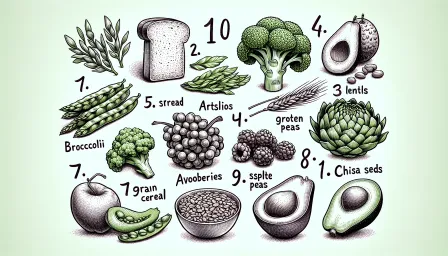Low-Carb Diet for PCOS: A Complete Guide to Managing Symptoms

Discover how a low-carb diet for PCOS can help manage symptoms and improve overall well-being. This comprehensive guide provides the information you need to make informed dietary choices.
Polycystic Ovary Syndrome (PCOS) is a common endocrine disorder affecting millions of women worldwide. One effective way to manage the symptoms of PCOS is through dietary changes, specifically adopting a low-carb diet. This article will explore the benefits of a low-carb diet for PCOS, provide practical tips, and offer guidance on how to get started.
Understanding PCOS and Its Symptoms
PCOS is a hormonal disorder characterized by enlarged ovaries containing multiple small cysts. These cysts can cause irregular menstrual cycles, excessive hair growth, acne, and obesity. Insulin resistance is a common feature of PCOS, further complicating the management of symptoms.
Why Choose a Low-Carb Diet for PCOS?
Insulin resistance is a condition where the body's cells do not respond effectively to insulin, leading to high blood sugar levels. For women with PCOS, reducing carbohydrate intake can help to lower insulin levels and improve insulin sensitivity. Here are some key benefits of a low-carb diet for PCOS:
1. Improved Insulin Sensitivity
By reducing carbohydrate intake, you can lower blood sugar levels and improve the body's ability to use insulin effectively. This can help manage weight and reduce other symptoms associated with PCOS.
2. Weight Management
Many women with PCOS struggle with weight gain. A low-carb diet can help you lose weight and maintain a healthy weight, further alleviating PCOS symptoms. Lowering carb intake helps reduce cravings and stabilize blood sugar levels, which can aid in weight loss.
3. Hormonal Balance
A low-carb diet can help regulate hormone levels, reducing symptoms such as irregular periods and excessive hair growth. Balancing insulin levels can positively impact other hormones, including androgens, which are often elevated in women with PCOS.
4. Reduced Inflammation
PCOS is often associated with chronic inflammation. A low-carb diet can lower inflammation levels, leading to better overall health and fewer PCOS symptoms. Low-carb diets typically emphasize whole foods like vegetables, lean proteins, and healthy fats, which are anti-inflammatory.
Getting Started with a Low-Carb Diet for PCOS
Transitioning to a low-carb diet may seem challenging at first, but with careful planning and support, it can become a sustainable lifestyle change. Here are some tips to help you get started:
Educate Yourself
Understand the basics of a low-carb diet, including which foods to eat and which to avoid. Focus on whole foods like vegetables, lean proteins, and healthy fats. Avoid processed foods and high-sugar items.
Create a Meal Plan
Plan your meals and snacks in advance to ensure you have healthy, low-carb options available. Consider consulting with a nutritionist specializing in PCOS to create a personalized meal plan.
Track Your Progress
Keep a food journal to monitor your carbohydrate intake and note any changes in your symptoms. Tracking your progress can help you stay motivated and make necessary adjustments.
Stay Hydrated
Drink plenty of water throughout the day. Staying hydrated is essential for overall health and can help reduce cravings.
Find Support
Join PCOS support groups or online communities to connect with others who are following a low-carb diet. Sharing experiences and tips can be incredibly motivating and helpful.
Sample Low-Carb Foods for PCOS
Here are some examples of low-carb foods that are beneficial for women with PCOS:
Vegetables
- Leafy greens (spinach, kale, arugula)
- Broccoli
- Cauliflower
- Bell peppers
- Zucchini
Proteins
- Chicken breast
- Turkey
- Fish (salmon, tuna)
- Eggs
- Tofu
Healthy Fats
- Olive oil
- Avocado
- Nuts and seeds
- Chia seeds
- Coconut oil
Potential Challenges and How to Overcome Them
Adopting a low-carb diet for PCOS can come with challenges. Here are some common obstacles and tips to overcome them:
Initial Adjustment Period
It's normal to experience fatigue or irritability as your body adjusts to lower carbohydrate intake. Stay hydrated, get enough sleep, and ensure you're eating enough healthy fats and proteins to keep your energy levels stable.
Social Situations
Eating out or attending social events can be challenging. Research and choose low-carb friendly restaurants. When attending gatherings, consider bringing a low-carb dish to share.
Plateaus
Weight loss plateaus can be frustrating. Reassess your carbohydrate intake and make sure you're not consuming hidden carbs. Increasing physical activity and incorporating strength training can also help break plateaus.
Conclusion
Managing PCOS with a low-carb diet can significantly improve symptoms and overall well-being. By understanding the benefits, planning meals, and staying committed, women with PCOS can achieve better health outcomes. Always consult with a healthcare professional before making significant dietary changes.
Remember, every individual's experience with PCOS is unique. What works for one person may not work for another. Stay patient and persistent, and you'll find the right approach that suits your body and lifestyle.



























